【改革开放40周年40人】Davide Cucino: Sino-Italian trade is resonant again in the new era of Silk Road
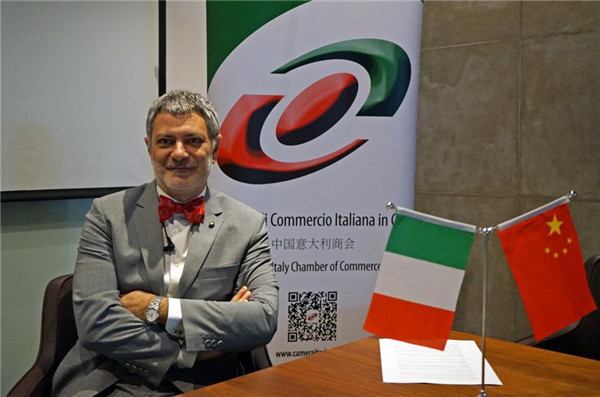
Davide
Cucino: Chairman of the China-Italy Chamber of Commerce
China and Italy, two ancient civilizations,
were the starting points of the ancient Silk Road. The exchanges between the
two countries have a long history and were recorded in the Travels of Marco
Polo. Nowadays, as the intersection of the "Silk Road Economic Belt" and the "21st- Century Maritime Silk Road", Italy is achieving an historic
reunion with China through the “Belt and Road initiative”. This will not only
promote the two countries'economic and trade growth, but also drive and
benefit the economic construction of all the countries along the Sino-European
Economic Belt.
The China-Italy Chamber of Commerce,
established in Beijing in 1991, has been a window and bridge for trade between
China and Italy for over a quarter of a century, and it definitely plays an
important role in promoting Italian companies' investment in China. As of 2017,
the number of members of the China-Italy Chamber of Commerce had reached 545,
covering Italy's main industries (Italian state-holding and multinational
corporations), small and medium-sized manufacturing and trading and consulting
companies.
Mr. Davide Cucino, current Chairman of the
China-Italy Chamber of Commerce, has lived in China for 30 years and is quite
familiar with almost every aspect of China. On the occasion of the 40th
anniversary of the reform and opening up, we’re honored to have Mr. Davide
Cucino here to share his views on how to do business in China, the trade
between China and Italy over the past 40 years, as well as the B&R
initiative.
Amiable Chinese officials and efficient
state-owned business
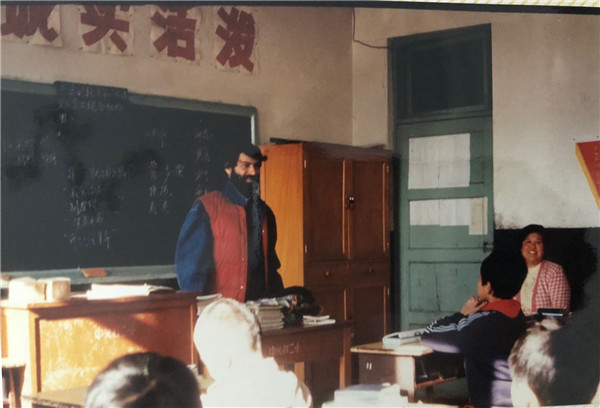
Davide
Cucino studied in Beijing in the early 1990s
"Last Saturday was the 30th
anniversary of my stay in China. And I still remember the first day I arrived
here. It was summer, really hot. There were noisy sounds and stalls selling
watermelons everywhere," Davide recalled at the beginning of the
interview. “Before I came, I had studied Chinese and Chinese history in Italy,
especially about the socioeconomic reforms during the Song Dynasty. That was
why I won the scholarship from the Chinese government and finally made my trip
to China for further study.” The once student but now typical Italian
businessman with a suit and a bow tie continued, “But seeing is believing. China
and the Chinese were different from what I had read in books.”
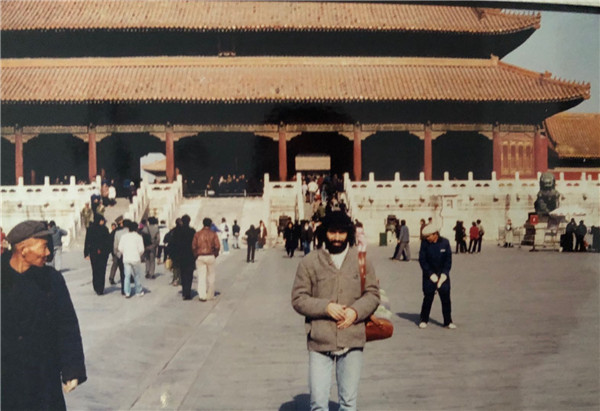
When Davide
Cucino just arrived in Beijing
Davide was the Chairman of the China-Italy
Chamber of Commerce for the first time from 2002 to 2010, and then served as
the Chairman of the European Union Chamber of Commerce in China from 2011 to
2014. These two experiences renewed Davide’s impressions on Chinese government
officials. “At first, I knew little about how everything was going. Before
meetings, I prepared a lot and was quite nervous. In fact, during the meeting, they
told us not to worry and feel relaxed. The officials, including Wu Yi, then
Minister of Commerce, and Zhong Shan, current Minister of Commerce, provided us
with a great atmosphere to communicate with each other. And my
colleagues and I all accumulated a wealth of experience about how to do
business in China during the process of dealing with Chinese government
officials."
And it is not only government officials but
also state-owned enterprises in China that have changed Davide's impressions.
He had worked for large Italian enterprises such as Fincantieri and
Finmeccanica and he was used to comparing the enterprises of the two countries. "Generally speaking, Chinese state-owned enterprises were supposed to have a
tighter connection with the government so that every step during the business
should be approved by multiple decision makers. While Italian ship or aviation
companies are partly state-holding, they have their own control systems. But today, to our surprise, Chinese state-owned enterprises make
very quick decisions so sometimes our Italian enterprises fail to follow the
plan. More importantly, now in a globalized environment, Chinese enterprises
are more market-oriented to be aligned with the global market and reduce the
consideration of relevant domestic policies. And the good news is that despite
the changes in the market environment, enterprises from the two countries have
always cooperated well."
More than food and fashion: Italian
technology and manufacturing contribute to China's development
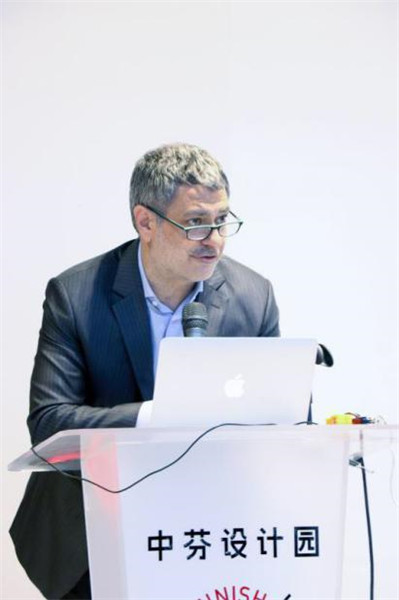
Davide
Cucino as the Chairman of the European Union Chamber of Commerce in China
During the interview, Davide mentioned
Italian high-tech and industrial equipment industry more than once, clearly
very proud of Italian Manufacturing. “Italy has been mainly well-known for its
clothing, food or wines for a long time. Actually, Italy is also very strong in
high-tech equipment. Most of Italy's exports are comprised of high-tech and
electromechanical equipment. Ferrari has long been a household name. However,
many parts of the F1 car, such as the wheel rim and hub, are also made in
Italy. Besides, a number of high-speed railways in Europe also use Italian
technology."
Italian technology and manufacturing have
also been indispensable to the rapid development of China. The Baoshan luxury
cruise project is a good example. On October 13, 2015, China state shipbuilding
corporation (CSSC), China Investment Corporation (CIC), Carnival Corporation,
Fincantieri Corporation, Lloyd's Register of Shipping, and Shanghai Baoshan
District Government issued a joint declaration on a six-party cooperation
agreement in the cruise industry. Among them, the Italian Fincantieri
Corporation is responsible for the cruise ships'design.
"When I first came, we had a steel
project in Baoshan. But these years it's developing rapidly and the local
government are very active in cooperating with foreign companies. The WuSongKou
International Cruise Terminal in Baoshan is now the largest cruise home port in
Asia with a yearly increasing demand." Speaking of the changes in Baoshan,
Davide, who has been there many times since the early 1990s, is deeply touched. "Today more and more Chinese choose to enjoy cruise travel and have higher
requirements for cruise services. In this respect, Italy is experienced. Almost
50% of the luxury cruises seen at the terminal are made by Italian companies
like Fincantieri. And Italian cruise operation companies like Costa also
contribute a lot." With the luxury cruise cooperation project between
China and Italy, maybe we could see a luxury cruise liner made in China in the
near future.
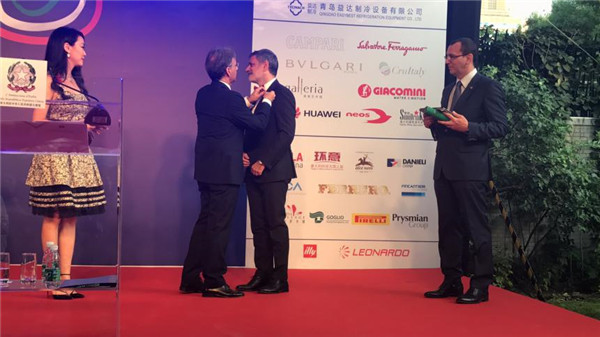
Davide
Cuccino as the Vice President of the Leonardo Company
As China continues to open up, more and
more domestic companies will choose to go global, and Italy is certainly a
popular trading partner. As the Chairman of the China-Italy Chamber of
Commerce, Davide knows a lot about the current situation. He mentioned that
Chinese companies have been investing in Italian technical industries including
motorcycles, automobile manufacturing, automobile design, marine engines and
agricultural machinery." There is a saying that Chinese investors have taken
away Italian technology. However, in fact these investments are win-win as they
help Italian local companies achieve stable employment and output." In a manner
of speaking, during the process of going global, Chinese companies not only
grow themselves but also bring tangible benefits to their partners.
Sino-Italian cooperation on the New Silk
Road
The "Belt and Road Initiative" is a new
chapter of the reform and opening up, allowing China to move into a new stage
on the road to openness, innovation and civilization. And Italy has always been
regarded as a bridge between European and Eastern countries. Whether for the "Silk Road Economic Belt" or the "21st Century Maritime Silk Road", Italy is no
doubt among the most important and active nodes.
"In May 2017, the Belt and Road Forum for
International Cooperation was held in Beijing. President Xi Jinping hosted the
Leaders Roundtable Summit and invited many countries to participate. In the
European Union, I think Italy is quite representative and could be a leading
country of this initiative." Davide is full of confidence for the future of the
B&R Initiative." There are several ports in Italy that have already
established cooperation with China such as Genoa, Venice and Trieste. And along
with the developed Italian railway network, goods can be delivered to any
major European countries once they arrive at these ports."
Maritime transport is unobstructed, and so
is land transport. Davide said that thanks to the Sino-European freight train,
goods from inland areas in China like Chengdu and Chongqing can now be transported
directly by train to the northern part of Italy and then delivered to the whole
of Italy - Naples in the Southern part, for example - through its railway
network.
Looking back into the past, the trade
volume between China and Italy in 1970 was only 120 million dollars, due to
China's inward-looking foreign trade protection policy before 1978. After
reform and opening up, the import and export volume skyrocketed from 1981 to
1995, reaching over 5 billion dollars in 1995. Although there exist
fluctuations, driven by the B&R Initiative, the trade volume between China
and Italy has been soaring again these years. According to statistics from
Eurostat, in 2015,the first year when the initiative was launched, the
bilateral trade volume in goods was US$42.8 billion, of which Italy exported
US$11.5 billion to China and imported US$31.2 billion from China. In 2017, it
was US$47.4 billion, US$15.3 billion, and US$32.1 billion, an increase of
10.7%, 32.8% and 2.6% respectively compared to 2015.
What's more, in addition to benefiting from
the B&R initiative, Italy can make more contributions. "The network of the Italian
Chamber of Commerce is comprised of 74 chapters covering countries alongside
the Belt and Road such as Vietnam and India," said Davide. "We will ask local
chapters to select some representative projects in respective countries that
match the B&R initiative. Definitely we may face difficulties, but we can take
advantage of this network and cooperate with China to promote our technical
support projects for infrastructure construction including railways and ports."
From Central Asia to Russia, from Iran to Pakistan, the Sino-Italian
cooperation is expected to bring prosperity to more countries along the route.
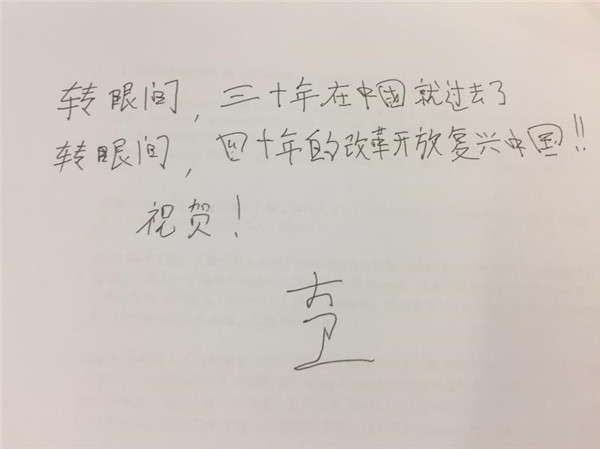
Davide
Cucino's wishes for China's reform and opening up
"As the saying of Confucius goes,‘success
lies in previous preparations.'It is not a sudden decision for a country to
reform and open up. China has a history of 5,000 years and had already
accumulated a profound foundation before China made changes. And that’s why
China made it in 40 years." Davide said at the end of the interview. "The trend
of globalization is irreversible, and I firmly believe China will remain open
continuously."






